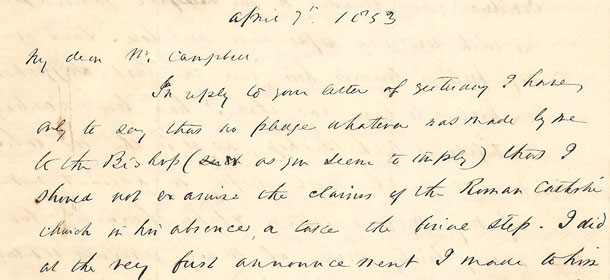March 30, 2009
Father George Stuart, vice chancellor and archivist for the Archdiocese of Washington, D.C., was skimming through eBay when he came across something interesting. The item was an original letter from a Francis Asbury Baker dated April 7, 1853. The description mentioned the Paulist Fathers, but primarily mentioned his work with the Episcopal Church.
“After reading this, I looked him up in the Catholic Encyclopedia, and when I saw that he was a convert to Catholicism (and not a defector from it) and one of the founders of the Paulists, I thought the letter must be worth acquiring for those reasons alone,” Father Stuart said.
The sum of $9.99 was paid to an antiques and autographs dealer in Manchester, Md., and Father Stuart gifted the precious letter to the Paulist Fathers archives.
“Thought the Paulist archives has a number of Baker’s published sermons, this letter, to the best of my knowledge, is his only piece of correspondence in our possession,” said Paulist archivist Father John Lynch.
The letter, written two days after Father Baker’s conversion to Catholicism, “explains why he determined to act in such an apparently preemptory manner,” Father Lynch said. “He could no longer defend the position of the Episcopal Church to a dying parishioner who wanted to become Catholic.”
In a brief biography written by Father Lynch, Francis A. Baker was born the son of a staunch Methodist physician in Baltimore on March 30, 1820. He joined the Episcopal Church around 1841, and became close friends with Augustine Hewit (who would also become Catholic and co-found the Paulist Fathers) while studying for the Episcopal ministry in Baltimore. Mr. Hewit became Catholic in 1846, but Mr. Baker was “determined to throw himself heart and soul into the work of realizing the catholicity of his own church,” Father Hewit said in Memoir, a biography of Father Baker. Ordained to the Episcopal priesthood in 1846, Mr. Baker became one of the most prominent Episcopal clergymen in Baltimore.
By 1851, however, Mr. Baker began to have doubts and came close to resigning his Episcopal ministry. At the urging of Bishop Wittinghan, Mr. Baker decided to postpone his decision on whether or not to stay with the church.
Church-building, and family illness and death occupied Mr. Baker’s mind in the months that followed, leaving little room for spiritual discernment.
 Father Augustine Hewit, C.S.P.
Father Augustine Hewit, C.S.P.In Memoir, Father Hewit recalls the Friday of Easter Week 1853. A young lady on her deathbed wished to die a Catholic, but was persuaded by her family to consult with Mr. Baker.
“When she pressed him for a reason why she should not fulfill her wish to be received into the Catholic Church before she died, [Mr.] Baker told her that he regretted very much that she had chosen to consult with him on that point, as there were reasons why he must decline giving her advice on that subject,” Father Hewit wrote. “She looked at him earnestly, and said, ‘I see how it is, Mr. Baker; you are in doubt yourself.’ Without saying a word, he left the room and the house.”
Mr. Baker resigned his post with the Episcopal Church the following Tuesday, April 5. He then went to see Archbishop Francis Patrick Kenrick, the Archbishop of Baltimore for the Roman Catholic Church. He then went over to St. Alphonsus Church to see his old friend, Father Augustine Hewit, now a Redemptorist priest.
“The conversion of Mr. Baker made a great sensation in Baltimore and wherever he was known,” said Father Lynch. “It was announced in the secular papers, and for some weeks a lively controversy arising out of it was kept up.”
Mr. Baker would follow in the footsteps of his friend, Father Hewit, and became a Redemptorist priest in 1856. The two joined Father Isaac T. Hecker in forming the Paulist Fathers in 1858. Beloved by all, Father Baker died of typhoid pneumonia contracted while ministering to the sick in April 1865, only nine years after his ordination as a Catholic priest.



